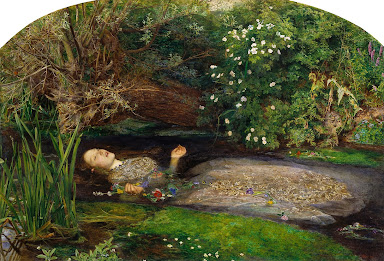 |
| Ophelia by John Everett Millais - Google Art Project |
The plays of William Shakespeare continue to be relevant because his characters' motivations, problems, and emotions are universal.
When I retired, I felt like Prospero at the end of The Tempest. In one job I had as an administrator, there were some days when I was in a scene from Julius Caesar. In college, I had a number of young Hamlet moments. In high school, I identified with Juliet and Romeo depending on the relationship.
I read a poem - Ophelia's Technicolor G-String: An Urban Mythology - about a reimagined modern-day Ophelia. In that poem, the sad, naive, and mistreated girlfriend of Hamlet is launched into modern times. She became quite different in our time and seems much happier.
Oh Hamlet, if you could see me now
as I pump and swagger across that stage, cape dripping to the floor,
me in three-inch heels and a technicolor G-string—
you would not wish me in a convent.
They’ve made me a queen here, married me off
to a quarter bag and a pint of gin.
It could be our model poem, but I started reading more about Ophelia and looking for other poems about her. My search turned up a few allusions to Polonius' daughter but no other model poem candidates.
So, for this prompt, I chose only to use Shakespeare's own words. It is the abridged love letter that Hamlet wrote to Ophelia that is intercepted by her father. Polonius reads it - well, some of it - to his wife Gertrude in Act II scene ii.
“To the celestial and my soul’s idol, the most beautified Ophelia”
“In her excellent white bosom, these...
(here Polonius interrupts his reading and "spares" Gertrude the sexy stuff)
Doubt thou the stars are fire,
Doubt that the sun doth move,
Doubt truth to be a liar,
But never doubt I love.
Thine evermore, most dear lady,
whilst this machine is to him.
Hamlet.
Before I get to our prompt this month, some more about Ophelia.
She is a naïve girl who wants to please both her father and her boyfriend. Shakespeare couldn't write about there being pre-marital sex between his two young aristocratic characters, but there are reasons to believe that they had sex though her father had warned her not to do such a thing. For instance, Hamlet says "Shall I lie in your lap, my lady?"and "Do you think I meant country matters?” (The latter generally interpreted to mean "Did you think I was talking about sex?. It is also a pun on a C-word expletive) A more definitive piece of evidence comes when Ophelia "goes mad" after her father's murder. One of the mad songs she sings includes the line "Before you tumbled me / You promised me to wed’” (IV.v.).
Ophelia is usually seen as a symbol of femininity and Hamlet unfairly takes out some of his aggression toward his mother on her. There is plenty of evidence that Hamlet is the cause of her madness. Modern-day feminists view Ophelia as trapped in a patriarchal society that requires subjugation to her father and her brother -at least until she is married,
Another interpretation bringing her into more modern times is that Ophelia's madness is really that she suffered from Post Traumatic Stress Disorder (PTSD) and deserves empathy rather than our pity.
In "Speaking of the future, Hamlet," Mary Jo Bang imagines the character's future, though not so far in the future to be in our time.
...My mother, the Queen, will want only
my father, the King. All will be want
& get. And I will be me. And O, O,
Ophelia—will be the essence of love.
The love of a sister. Or, the love of the
brother. Compassion. Forgiveness...
In "Wild Bees," James K. Baxter briefly imagines our own Ophelia not drowned but "...on a tarred bridge plank standing / Or downstream between willows, a safe Ophelia drifting / In a rented boat."
In Meghan O'Rourke's "Ophelia to the Court," we wonder why she is in court and saying "First he thought he had a wife, then / (of course) he thought he had a whore."
For our November call for submissions, we are looking for poems where a character(s) from Shakespeare is brought into our time or the voice of the poem identifies with some aspect from the character's life. Make it clear which character (play?) you are alluding to, and if you use lines from the play indicate that with quotation marks or italics.
Need to brush up on your Shakespeare?
Wikipedi has a list of characters from the plays to get you started.
Submission Deadline: November 30, 2021
Visit our website at poetsonline.org

No comments:
Post a Comment
* * All comments must be approved by the site administrator before appearing in order to prevent spam.